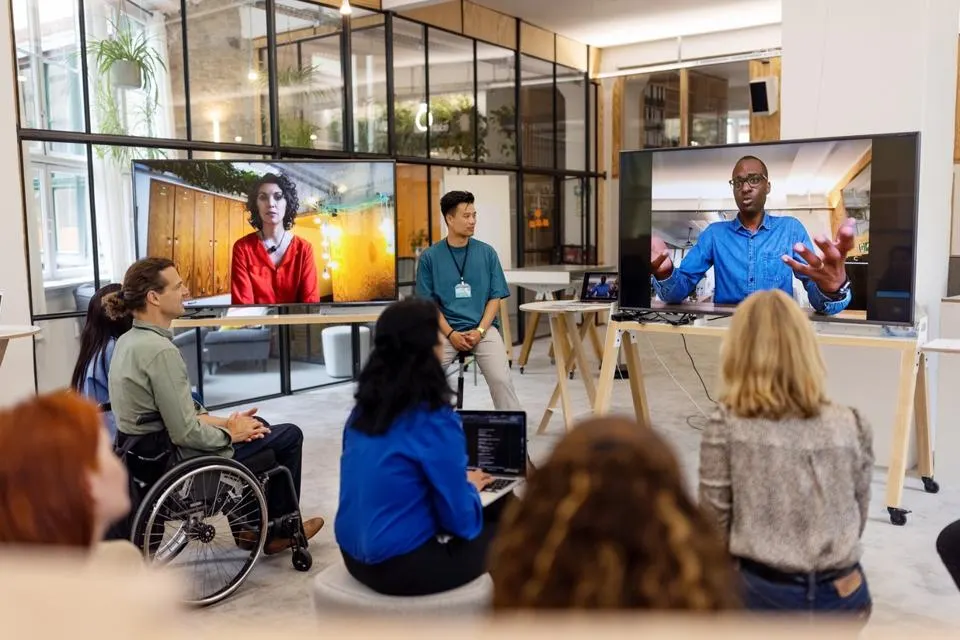Why HR must prioritize digital workplace transformation
Most IT leaders believe that Gen AI-powered personalization is key to unlocking productivity and engagement, but they are held back by inflexible IT systems. Lenovo’s latest research outlines how digital transformation can help HR teams change that.
Take equal responsibility
Productivity is no longer just an IT issue. HR leaders are equally accountable for shaping the digital workplace, ensuring employee needs are reflected in technology strategy. So, while Lenovo’s global survey reveals that productivity is a priority for IT leaders—we know it is for HR too. And today’s workplace is underperforming.
Lenovo’s first Work Reborn study, ‘Reinventing Workplace Productivity’ reveals:
- Nearly half (49%) of IT leaders say productivity is their main objective.
- 51% rank increasing productivity in their top three priorities.
- Fewer than half (40%) believe their current digital workplace helps them increase productivity ‘very effectively’.1
Hybrid workplaces are also fragmenting the employee experience and, sometimes, impacting productivity and innovation. It’s clear there’s a need for change.
Rakshit Ghura, VP and General Manager of Digital Workplace Solutions at Lenovo, says: “Many customers are now embracing hybrid working. So, I see that workplace fragmentation is increasing. Hybrid and distributed work has created inconsistent employee experiences—leading to the launch of lots of new technologies and new tools that have reduced IT visibility.”
HR executives need to create an office environment that is unified, smooth and built for everyone. One that enables productivity, minimizes disruption and makes work seamless. And that requires hyper-personalization.
Implement hyper-personalization
The digital workplace must support individual work styles, and most IT leaders believe this:
- 65% feel that personalizing employees’ working environment is ‘critical’ or ‘very important’ to providing a productive and engaging employee experience.
- Yet nearly half (48%) rank ‘a limited ability to configure devices and applications to users’ individual needs’ in the top three greatest challenges.
- 46% of IT leaders said security precautions impair the user experience.
- And 38% of IT leaders reported limited visibility into users’ individual needs.1
HR teams must work with IT to ensure the digital workplace accommodates every worker’s needs. Rakshit Ghura explains: “It’s important no employee is left behind. It goes without saying that in our workforce we have employees who may have accessibility needs, employees who may have special needs, some people who may be tech savvy, some who might be frontline workers.
“Ideally, your workplace should deliver for all, and it should deliver equally. Everybody should be able to consume the workplace in the right way. And the workplace should help you do your job in the most effective manner.”
Building a workplace that supports diverse roles and approaches is critical. For example, three people doing the same task will take three different approaches. The first may set detailed timelines with clear goals, the second might start by brainstorming with others, while the third may use data to drive their decisions.
Organizations need to accommodate for this and provide the tools to help each employee succeed. And this is where HR must take equal responsibility—not just advocating for personalization but helping define how technology choices translate into real employee experience gains. However, for this level of personalization, organizations need Gen AI.
Unlock Gen AI’s full potential
Gen AI enhances collaboration and productivity by helping employees focus on more important work. In fact:
- 57% of the 600 IT leaders surveyed believe Gen AI could have a ‘significant positive impact’ on employee collaboration, employee creativity (55%) and productivity (41%).
- 79% of IT executives believe that by automating operational processes, AI will allow employees to focus on more impactful and important work.
- 82% believe that businesses that use AI to automate operational processes and help employees focus on what matters will be most successful.
- And 76% believe that businesses who fail to empower their employees with AI will fall behind in the next one to two years.1
AI allows personalization that would previously have been too complex and time-consuming. But businesses struggle to put Gen AI into practice and achieve significant increases in productivity.
Art Hu, Senior Vice President and CIO at Lenovo Solutions and Services Group, says: “Ten years ago, talking about hyper-personalization would have made IT folks’ hair stand up. They would have said, ‘We need standardization, otherwise we’ll have complexity that we cannot manage.’ With Gen AI, that complexity becomes manageable. Using persona-based configuration, we examine user profiles more deeply and personalize the employee experience much more precisely.”
Employees need to be able to think, create and collaborate without disruption. And this requires HR leadership. HR executives bring critical insight into employee behavior, expectations, and culture—nuances where IT alone cannot deliver. And by taking an active role, HR can enable Work Reborn: digital workplace strategies that unlock employee’s full potential.
Unleash digital workplace transformation
HR can’t afford to leave digital workplace strategy to IT. It’s essential for unlocking the potential of AI, enabling productivity and enhancing the employee experience. And 89% of IT leaders agree that ‘enabling our employees to most effectively use AI requires digital workplace transformation.’ But despite this only a minority have started to transform.
This is partly due to employee resistance, with nearly half (42%) of IT leaders saying employees are concerned that generative AI will reduce the contribution of their work to the business.2 There’s a perception that ‘AI is coming to take everybody’s job,’ which is the cause of this anxiety.
HR teams are vital in addressing these concerns. HR leaders need to understand employee sentiment and influence IT decision-makers. Then by clearly communicating the impact AI implementations will have on employee’s roles, they can reassure workers and help them upgrade their skills.
But what positive impact can HR communicate? Vijay Gopal, Global Offering Leaders, Lenovo Digital Workplace Solutions, sees identifying “value creation levers” as a key step in transforming for AI. He explains:
“Fundamentally, you must transform your workplace to be able to leverage Gen AI. Automating your current processes and workflows will only yield incremental benefits. All organizations take inputs and generate outputs to create value. So, you need to know the top 10 value creation levers that you have; and how you would do them differently today with Gen AI.”
Understanding and sharing those value levers—and the everyday benefits they bring—will help HR get employees onboard.
It’s time for Work Reborn
To successfully maximize productivity, digital workplace transformation must take place. But how can you accommodate the needs of employees while enabling cost savings and better outcomes? It’s all about capturing “the voice” of your people.
In Lenovo’s second Work Reborn study, ‘Igniting Real Workplace Transformation’ Rakshit Ghura shares: “Many times, we have seen this transformation is not very successful because we haven’t captured the voice of the employee. It is equally important to have the voice of the employees included as part of the digital workplace transformation, so that we are creating a holistic strategy through which we can provide the best-in-class experience to the employees.”
To achieve this, HR must take equal responsibility alongside IT and co-own digital workplace transformation. Together, they can build AI-powered workplaces that are not only more productive, but also more human-centered, inclusive and adaptable.
Source – https://hrexecutive.com/hr-must-drive-digital-transformation-to-enhance-workplace-productivity/




















